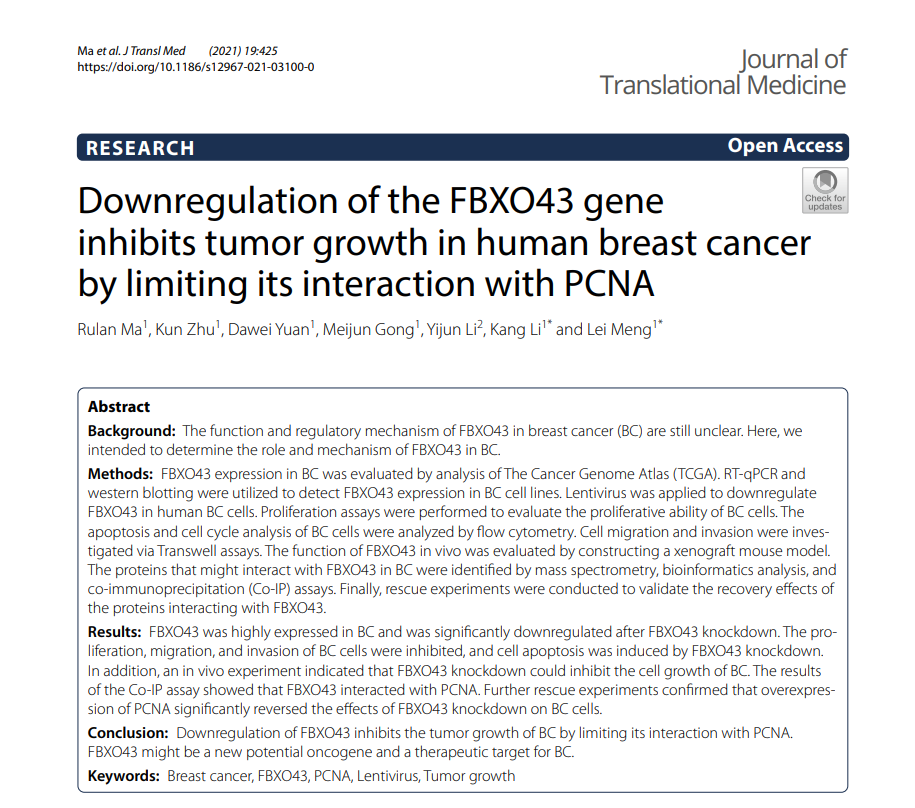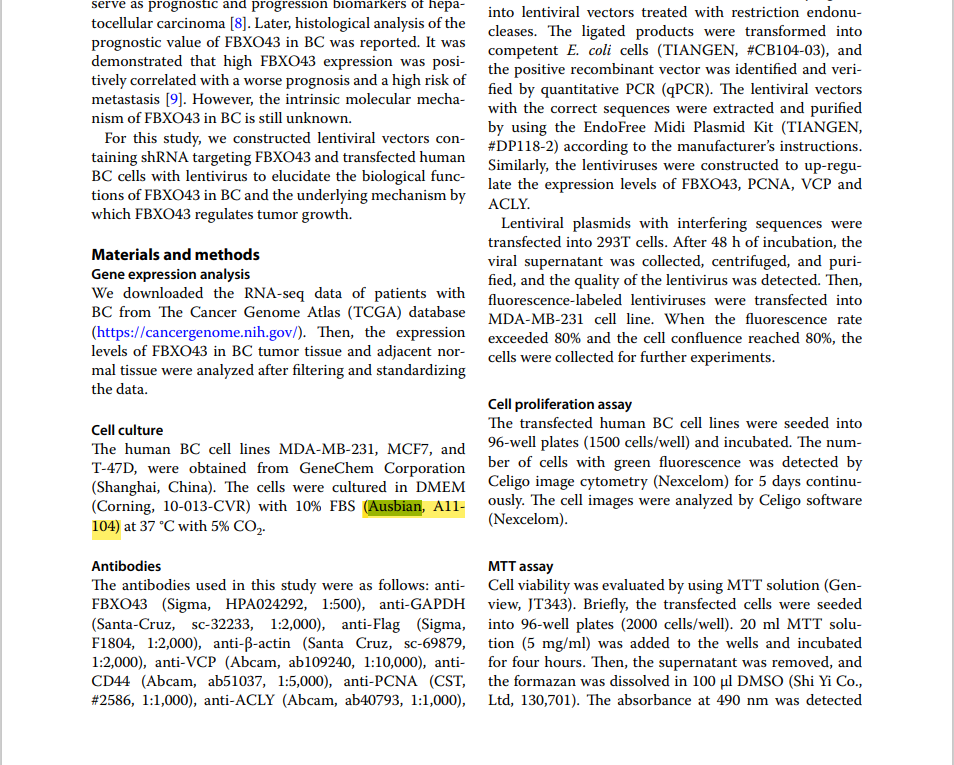2021年8月,首都醫科大學北京天壇醫院神經外科;上海交通大學醫學院銅仁醫院骨科;上海交通大學醫學院仁濟醫院骨科(Department of Neurosurgery, Beijing Tiantan Hospital, Capital Medical University, No. 119 Nansihuan Xilu, Beijing 100070, China;Department of Orthopaedic Surgery, Tongren Hospital, Shanghai Jiao Tong University School of Medicine, No. 1111 Xianxia Road, Shanghai 200336, China;Department of Orthopaedic Surgery, Renji Hospital, Shanghai Jiao Tong University School of Medicine, No. 2000 Jiangyue Road, Shanghai 200127, China) Kang Li老師研究團隊在《Cell Death & Disease》上發表論文:
“Downregulation of the FBXO43 gene inhibits tumor growth in human breast cancer by limiting its interaction with PCNA”
“FBXO43基因的下調通過限制其與PCNA的相互作用抑制人類乳腺癌的腫瘤生長”
Abstract:
Background:
The function and regulatory mechanism of FBXO43 in breast cancer (BC) are still unclear. Here, we intended to determine the role and mechanism of FBXO43 in BC.
Methods:
FBXO43 expression in BC was evaluated by analysis of The Cancer Genome Atlas (TCGA). RT-qPCR and western blotting were utilized to detect FBXO43 expression in BC cell lines. Lentivirus was applied to downregulate FBXO43 in human BC cells. Proliferation assays were performed to evaluate the proliferative ability of BC cells. The apoptosis and cell cycle analysis of BC cells were analyzed by flow cytometry. Cell migration and invasion were investigated via Transwell assays. The function of FBXO43 in vivo was evaluated by constructing a xenograft mouse model. The proteins that might interact with FBXO43 in BC were identified by mass spectrometry, bioinformatics analysis, and co-immunoprecipitation (Co-IP) assays. Finally, rescue experiments were conducted to validate the recovery effects of the proteins interacting with FBXO43.
Results:
FBXO43 was highly expressed in BC and was significantly downregulated after FBXO43 knockdown. The proliferation, migration, and invasion of BC cells were inhibited, and cell apoptosis was induced by FBXO43 knockdown. In addition, an in vivo experiment indicated that FBXO43 knockdown could inhibit the cell growth of BC. The results of the Co-IP assay showed that FBXO43 interacted with PCNA. Further rescue experiments confirmed that overexpression of PCNA significantly reversed the effects of FBXO43 knockdown on BC cells.
Conclusion:
Downregulation of FBXO43 inhibits the tumor growth of BC by limiting its interaction with PCNA. FBXO43 might be a new potential oncogene and a therapeutic target for BC.
摘要:
背景:FBXO43在乳腺癌(BC)中的作用和調控機制尚不清楚。在這里,我們打算確定FBXO43在BC中的作用和機制。
方法:采用腫瘤基因組圖譜(TCGA)分析FBXO43在BC中的表達。RT-qPCR和western blotting檢測FBXO43在BC細胞株中的表達。應用慢病毒下調人BC細胞FBXO43。采用增殖試驗評價BC細胞的增殖能力。流式細胞術分析BC細胞凋亡及細胞周期變化。Transwell法檢測細胞遷移和侵襲。通過構建異種移植小鼠模型,評估FBXO43在體內的功能。通過質譜分析、生物信息學分析和共免疫沉淀(Co-IP)分析,鑒定了BC中可能與FBXO43相互作用的蛋白。最后,通過營救實驗驗證與FBXO43相互作用的蛋白的恢復效果。
結果:FBXO43在BC中高表達,FBXO43敲低后顯著下調。敲低FBXO43可抑制BC細胞的增殖、遷移和侵襲,誘導細胞凋亡。此外,體內實驗表明,FBXO43敲低可以抑制BC細胞的生長。Co-IP實驗結果顯示FBXO43與PCNA相互作用。進一步的救援實驗證實,PCNA過表達可顯著逆轉FBXO43敲低對BC細胞的影響。
結論:FBXO43的下調通過限制其與PCNA的相互作用抑制BC的腫瘤生長。FBXO43可能是一種新的潛在癌基因和治療BC的靶點。
該論文中,人BC細胞系MDA-MB-231、MCF7和T-47D細胞的體外培養是使用Ausbian特級胎牛血清完成的。欲了解或購買Ausbian特級胎牛血清可以聯系北京締一生物400-166-8600.






